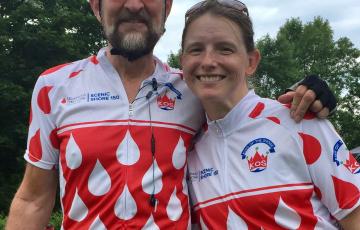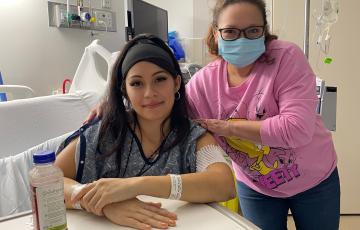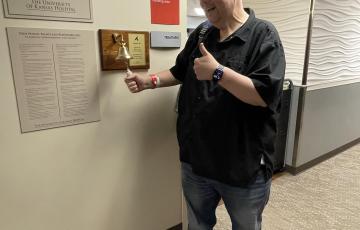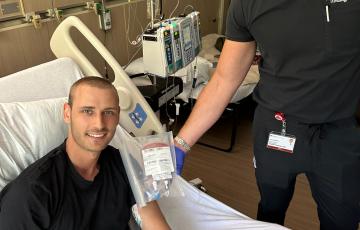Search Results
Jaimie Potvin
Finding cures for cancer is especially close to my heart. In 2011, my brother, Cory was diagnosed with large B-cell lymphoma. Our dad was already a two-time survivor of non-Hodgkin lymphoma, so we truly believed he would survive blood cancer too. When his treatment showed no signs of improvement, it was devastating. Cory died six years ago and I still miss him so much every single day.

Paul
I have been very active with The Leukemia & Lymphoma Society (LLS) for over 20 years including serving on the Wisconsin Chapter Board and Leadership Development Committee, fundraising for virtually all of the campaigns, patient mentoring, and advocacy leadership. When sharing my story and motives for involvement in “the early years,” I always qualified it by stating that I was motivated not to help myself but to pay it forward and hopefully contribute to improving the quality and quantity of life for future patients and families.

Olivia
I'm officially nine months in remission and just celebrated my first birthday (27!) since finishing chemotherapy treatment. In January 2022, I was diagnosed with stage IVB Hodgkin lymphoma (HL) after taking almost nine months to officially be diagnosed. Unfortunately, delayed diagnoses are often the frustrating truth for many adolescent and young adult cancer patients. However, during those nine months, I learned invaluable lessons on how to advocate for myself and persevere until I had answers.

Mayra
I am 28 years old and a mother of two. Last year on December 19, 2024, I was diagnosed with acute myeloid leukemia (AML), an aggressive blood cancer. My world was turned upside down as I had no idea what I would be dealing with or if I was going to make it. Cancer is something no one ever wants to hear.

Thomas
I had bariatric surgery on May 11, 2022. At the time, I weighed just under 600 pounds, and I understood that there was a higher possibility for complications. My three-hour procedure turned into a six-hour procedure, and my overnight stay in the hospital turned into a week. During surgery, they discovered my spleen was significantly larger than normal, and in the days following my surgery, I kept losing blood. After two exploratory surgeries, four units of blood, and a trip to the ICU later, I was finally released from the hospital with no confirmed cause of bleeding.
Luz
My name is Luz, and my story begins in a magical town in Mexico where I spent a wonderful childhood surrounded by my family. As the youngest of nine siblings, I learned the value of support and connection, values which continue to guide me today as a happily married mother of three beautiful daughters. For over twenty years, Chicago has been my home.

Hudson
Hudson entered the world on March 31, 2017. This is the day my heart left my own chest and was beating outside of my body. My whole world was immediately consumed by this little, perfect bundle of cuteness. As far as cancer risk goes, he didn’t really have any. He had a healthy infancy and toddlerhood, barely needing a Band-Aid. This is the case for so many children. In November of 2018, Hudson became a big brother to Violet. I can remember being in the studio for Violet’s newborn photos when the photographer had Hudson lay beside Violet.

Howie
In January 2014 I got pneumonia for the third in under two years. The hematologists examined my blood and suspected CLL, since my white-blood count was so low. Then a bone-marrow biopsy confirmed this. This certainly explained my inability to fight infections. I skipped all the steps in the grieving process and went straight to acceptance: It is what it is.

Laura
My mom raised seven kids before finding out she had myelodysplastic syndrome (MDS) and lymphoma, as well as Parkinson’s. She was going through treatment for the blood cancers, getting infusions of Rituxan® for the lymphoma, and transfusions of usually two units of blood when her red blood cell count was too low. We (us kids who live local) would sit with her (whoever was available) for the six+ hours it took for whichever treatment she was getting at the time. We played cards, fed her chocolate ice cream, laughed, and visited.

Matt
I’ve lived a mostly normal 27 years on this earth. A life filled with wonderful academics, Division 1 athletics (pole vault), financial internships, and fantastic sales roles at companies I really enjoyed.
However, my life changed drastically on February 28th, 2023.
In the middle of the night on that Tuesday, I was woken up by a call from an unknown number. I let it ring through… maybe it was spam? Then they called again.

Denise
I am passionate about Team in Training (TNT) because I am a cancer survivor, diagnosed with ovarian germ cell cancer (27 years ago at age 31). I had surgery, several rounds of chemo, and was then CURED! I joined TNT the following spring to ride El Tour de Tucson, a 111-mile bike race in Arizona (November 1997).

Megan
I am a 12-year-old girl who likes to play soccer and basketball, and I am in 7th grade. I was diagnosed with myelodysplastic syndromes (MDS-EB) with monosomy 7. It is a blood cancer similar to leukemia. It is extremely rare for pediatric patients to receive this diagnosis, between 1-4 children out of every million.

Jonathan
I’ll start from the beginning.
In 2012, I was diagnosed with testicular cancer. I had surgery to remove the mixed germ cell tumor and then was on the road to recovery. My lymph nodes were larger than they should have been, so I opted to err on the side of caution and had a lymph node dissection to have them removed. That was an invasive surgery that kept me out of work and from doing any physical activity for over six months. Once I healed up, I went back to work as a full-time police officer in Worcester, MA.

Oakley
Oakley was a typical 2-year-old going to gymnastics and play dates with her friends until a week after her third birthday when she began to decline health-wise very quickly. Oakley’s eyes began to swell, alternating between both eyes. We went to one urgent care visit, two ER visits, a visit with her primary pediatrician, and two blood draws before she was diagnosed with acute lymphoblastic leukemia (ALL).

Christen
Originally from northern New York, Christen moved to Denver, Colorado, in 2015 after completing her Bachelor of Science of Nursing at Le Moyne College to pursue a career in cancer care. Through a close relationship with her grandparents, she saw how her grandma, a retired registered nurse, graciously cared for her grandpa while he lived with esophageal cancer for close to a decade. The unwavering love, dedication, and courage they shared inspired Christen to seek out a specialty that allowed her to provide compassionate, holistic care to those in need.

Christina
As a Greek Latina indie author, I found it empowering to share my fight with lymphoma through social media and with my current writing. Many have told me that it’s inspiring, and I hope that leads to more attention and support for those fighting blood cancers like lymphoma.

Deanna
Within 24 hours of going to the local emergency room in New York, I found myself being admitted to the Dana Farber/Brigham Women's Cancer Center in Boston. It was August of 2013 and I was exhausted beyond anything my four kids could inflict upon me and shocked to find out it wasn't anemia, I had acute lymphoblastic leukemia (ALL).

Rachel
My name is Rachel Iruegas, and on June 4, 2019, I heard the dreaded words that no one ever wants to hear: “you have cancer.” I was diagnosed with stage 2B Hodgkin lymphoma (HL). In that moment, my mind went blank and my body numb. I honestly do not remember much of what my oncologist said after that. I knew I was in the room with her, surrounded by my family, but my body wanted to be somewhere else – anywhere else but there. I knew in that moment that my life was going to completely change, and I had no way of stopping that.

Allyson
In November 2016 I was tired. TIRED. I had a 20-month-old and a 4-year-old, had just come off the busiest month of the year for work, and I figured I was tired for no other reason. But then tired became not having the energy to take care of my 20-month-old. Tired became going to be my best friend's wedding and needing to lay down in between steps. Shower, lay down. Makeup, lay down. Hair, lay down. Get dressed, sit for a minute. Walking a long hallway seemed daunting. And then carrying my son from my car at a gas station to the restroom inside on a road trip was too much.

Ashley
Three little words changed my life forever!

Georgia
Today I would like to give thanks to The Leukemia & Lymphoma Society. With the fantastic staff, and volunteers we have truly come so far. As an ALL survivor, Team In Training Alumni, and participant it is so amazing to see what we have all done for blood cancer patients and their families.

Michael
My journey started in 2002 with a lump in my right arm pit. After a year of testing, I was diagnosed with Hodgkin Lymphoma. I was 30 at the time. After 18 months of treatment, including radiation and 15 rounds of chemo, I was cleared in 2005 after two pet scans. In September of 2012, things changed. I was working part-time for a medical transport company and took a patient to my doctors’ office. The nurse asked me why I didn’t come back; so, I made an appointment for February 2013. The blood work looked great so they scheduled a cat scan and it showed enlarged nodes.
